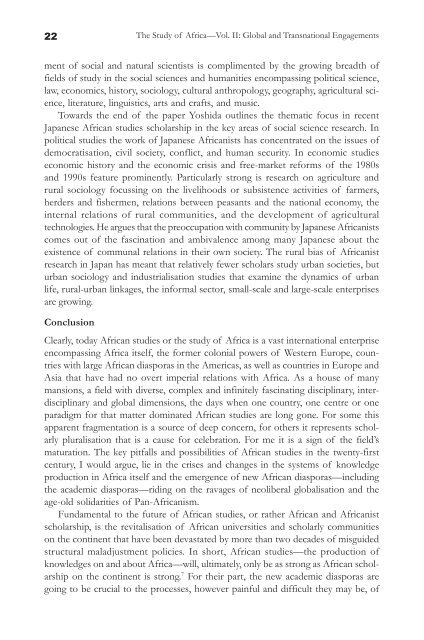The Study of Africa - African Books Collective
The Study of Africa - African Books Collective
The Study of Africa - African Books Collective
Create successful ePaper yourself
Turn your PDF publications into a flip-book with our unique Google optimized e-Paper software.
22<br />
<strong>The</strong> <strong>Study</strong> <strong>of</strong> <strong>Africa</strong>—Vol. II: Global and Transnational Engagements<br />
ment <strong>of</strong> social and natural scientists is complimented by the growing breadth <strong>of</strong><br />
fields <strong>of</strong> study in the social sciences and humanities encompassing political science,<br />
law, economics, history, sociology, cultural anthropology, geography, agricultural science,<br />
literature, linguistics, arts and crafts, and music.<br />
Towards the end <strong>of</strong> the paper Yoshida outlines the thematic focus in recent<br />
Japanese <strong>Africa</strong>n studies scholarship in the key areas <strong>of</strong> social science research. In<br />
political studies the work <strong>of</strong> Japanese <strong>Africa</strong>nists has concentrated on the issues <strong>of</strong><br />
democratisation, civil society, conflict, and human security. In economic studies<br />
economic history and the economic crisis and free-market reforms <strong>of</strong> the 1980s<br />
and 1990s feature prominently. Particularly strong is research on agriculture and<br />
rural sociology focussing on the livelihoods or subsistence activities <strong>of</strong> farmers,<br />
herders and fishermen, relations between peasants and the national economy, the<br />
internal relations <strong>of</strong> rural communities, and the development <strong>of</strong> agricultural<br />
technologies. He argues that the preoccupation with community by Japanese <strong>Africa</strong>nists<br />
comes out <strong>of</strong> the fascination and ambivalence among many Japanese about the<br />
existence <strong>of</strong> communal relations in their own society. <strong>The</strong> rural bias <strong>of</strong> <strong>Africa</strong>nist<br />
research in Japan has meant that relatively fewer scholars study urban societies, but<br />
urban sociology and industrialisation studies that examine the dynamics <strong>of</strong> urban<br />
life, rural-urban linkages, the informal sector, small-scale and large-scale enterprises<br />
are growing.<br />
Conclusion<br />
Clearly, today <strong>Africa</strong>n studies or the study <strong>of</strong> <strong>Africa</strong> is a vast international enterprise<br />
encompassing <strong>Africa</strong> itself, the former colonial powers <strong>of</strong> Western Europe, countries<br />
with large <strong>Africa</strong>n diasporas in the Americas, as well as countries in Europe and<br />
Asia that have had no overt imperial relations with <strong>Africa</strong>. As a house <strong>of</strong> many<br />
mansions, a field with diverse, complex and infinitely fascinating disciplinary, interdisciplinary<br />
and global dimensions, the days when one country, one centre or one<br />
paradigm for that matter dominated <strong>Africa</strong>n studies are long gone. For some this<br />
apparent fragmentation is a source <strong>of</strong> deep concern, for others it represents scholarly<br />
pluralisation that is a cause for celebration. For me it is a sign <strong>of</strong> the field’s<br />
maturation. <strong>The</strong> key pitfalls and possibilities <strong>of</strong> <strong>Africa</strong>n studies in the twenty-first<br />
century, I would argue, lie in the crises and changes in the systems <strong>of</strong> knowledge<br />
production in <strong>Africa</strong> itself and the emergence <strong>of</strong> new <strong>Africa</strong>n diasporas—including<br />
the academic diasporas—riding on the ravages <strong>of</strong> neoliberal globalisation and the<br />
age-old solidarities <strong>of</strong> Pan-<strong>Africa</strong>nism.<br />
Fundamental to the future <strong>of</strong> <strong>Africa</strong>n studies, or rather <strong>Africa</strong>n and <strong>Africa</strong>nist<br />
scholarship, is the revitalisation <strong>of</strong> <strong>Africa</strong>n universities and scholarly communities<br />
on the continent that have been devastated by more than two decades <strong>of</strong> misguided<br />
structural maladjustment policies. In short, <strong>Africa</strong>n studies—the production <strong>of</strong><br />
knowledges on and about <strong>Africa</strong>—will, ultimately, only be as strong as <strong>Africa</strong>n scholarship<br />
on the continent is strong. 7 For their part, the new academic diasporas are<br />
going to be crucial to the processes, however painful and difficult they may be, <strong>of</strong>


